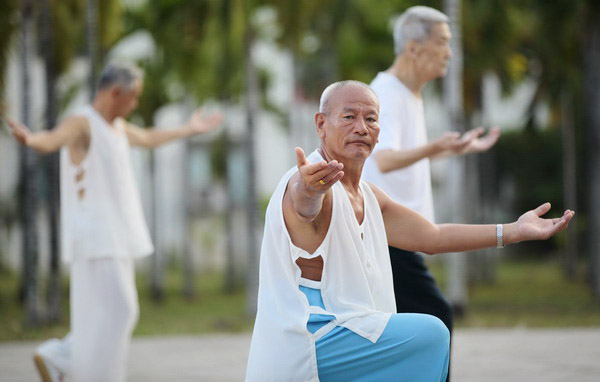Companies eye opportunities as spending power of nation's older people set to rise
"Show your love for your parents and grandparents, who have cared for you since you were a baby; care for them now, like they are babies!"
So reads a slogan for a shop on Taobao - an online marketplace - selling adult diapers.
Lu Jianxiang, the shop's owner, said that sales of adult diapers have been increasing over the past two years.
|
 Senior citizens exercise in Sanya, Hainan province. China will have 221 million over-60s by 2015, according to the Ministry of Civil Affairs. [Photo/China Daily] |
"Although the sales volume is much lower than baby diapers, the growth rate is much higher," said Lu.
"China is becoming an aging society. The elderly, including our parents and grandparents, deserve a dignified life," said the 32-year-old Beijinger.
China had 185 million over-60s by the end of 2009, accounting for 13.7 percent of the population. That number will jump to 221 million by 2015 and 250 million by 2025, according to the Ministry of Civil Affairs.
A report from international marketing firm Ogilvy & Mather said that Chinese senior citizens' spending power is rising.
They command about 300 billion yuan ($47.21 billion) to 400 billion yuan in annual disposable income, a figure which is expected to grow to 5 trillion yuan over the next three decades.
As a result, the demand for various products and services for the elderly will witness a boom in the coming decades in China, which will also be prompted by the increasing spending power of the daughters and sons of the elderly, said the report.
Personal care
Adult diapers, which are usually for the elderly and people suffering from urinary incontinence, were introduced into the Chinese market a few years ago.
Lu's online store sells a number of brands including Depend, from international paper-based personal care products company Kimberly-Clark Corp, Chinese brands Qianzhiya and Baodaren, and Merries from Japan-based chemical and cosmetics company Kao Corp.
"The adult-care category is growing at low double digit rates today in China," said Kenneth Whitaker, sales and marketing vice-president of Kimberly-Clark China.
"Depend is growing slightly faster than the category average and we expect the next three to five years to deliver consistently healthy growth," he said.
The main distribution channels for Depend are hypermarkets, supermarkets and increasingly e-commerce.
Zhu Weihua, an analyst at domestic brokerage China Merchants Securities, said that the size of Depend products in China is somewhat smaller than those in the US and European markets.
The company has introduced multiple choices for Chinese consumers, such as protective underwear and a strapped diaper - which is easier to put on and take off.
There is also a type that is suitable for paralyzed elderly people. It has an adjustable elastic plaster at the back to prevent leakage when the user is lying down. It is also fitted with a gauge to indicate the quantity of urine.
However, Whitaker said China's adult-care market is generally underdeveloped compared to others in Asia and is primarily focused on briefs and bed pads.
Depend is relatively unknown in China, so distribution is limited compared to Kimberly-Clark's many other well-known consumer goods categories.
Price is also a factor, as foreign brands, such as Depend, generally cost 30 to 50 percent more than their Chinese counterparts.
"We like to think that our advantages include excellence in quality, a differentiated positioning of our brand and fair pricing. When combined we believe these elements are very compelling for our Depend users," said Whitaker.
